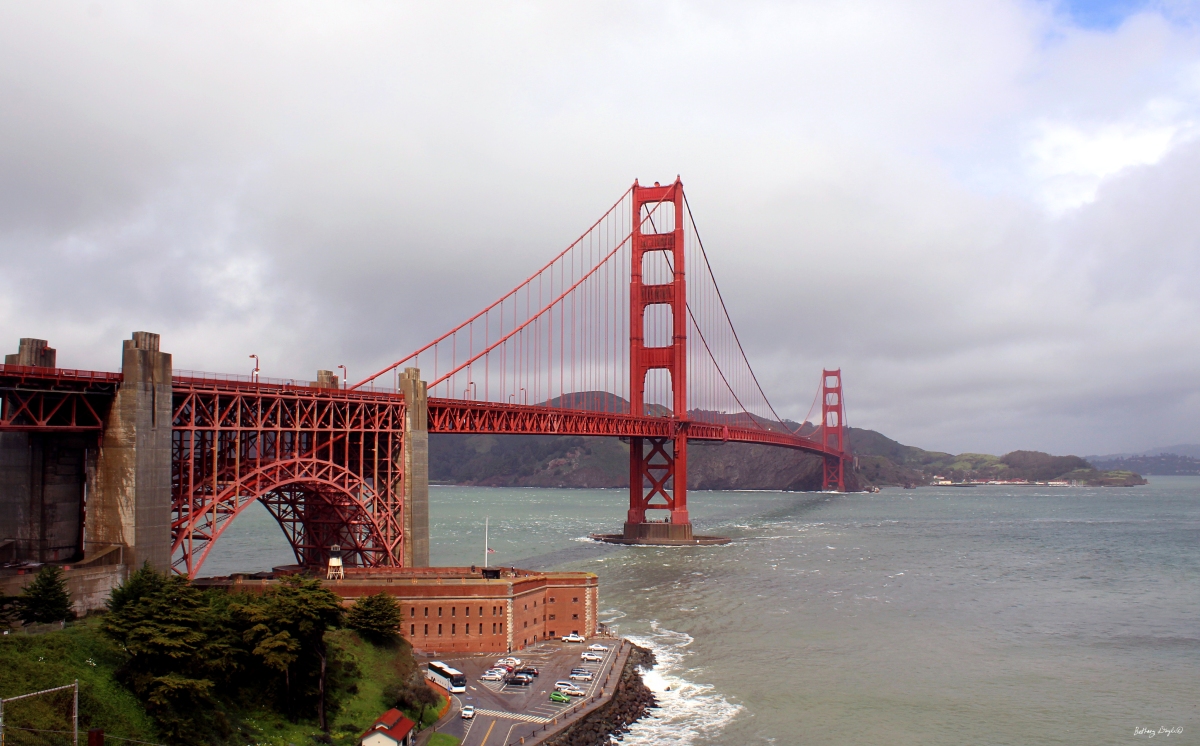I realized in December of 2015, that I had no idea what I was going to do for Spring Break. I knew that if I went home, although my family would be very happy to see me, it was unlikely that I would do anything other than sitting at home and reading. A Spring Break such as that would be boring, and as a person who has discovered since going to college, that I require stimulation and social interaction, basically doing nothing would not be ideal. Bringing a friend home to New York sounded fun but difficult. Plane tickets anyone? It all changed on Friday, January 15th when I received disappointing news that I would not received the summer job that I had wanted for a while. The news left with me burning with a desire to do something, and I as I walked past the Breakaway trip table in Lower Beamer, in the spur of the moment without thinking twice, I grabbed the information for the trip to San Francisco, determined to sign up.
I signed up quickly, and my Spring Break plans were settled. The days ticked by, until my alarm clock loudly rang at the ungodly hour of 2:30am on Saturday, March 5th. I was going to San Francisco. The next few hours went by quickly. We were bussed from campus to Midway International Airport, where we boarded a 6:20am flight to Las Vegas, where we had nice layover and a 9:50am flight to San Francisco, except the morning flight from Las Vegas to San Francisco did not happen. After waiting at our gate for a while, an announcement went out at boarding time that our flight was cancelled. This commenced an eight-hour layover in the airport in which we debated going into the city, but did not, rode the tram a few times, got second-breakfast and lunch (which for some people was third-breakfast), played games, and perfected the art, commonly practiced art by people of our generation, of hanging out. We got to know each other well before we arrived.
We eventually boarded an airplane with a final destination of San Francisco, and a half-hour layover in San Diego. I had apparently already made friends, because while in our layover, when I was attempting to do my English homework, some of my teammates thought that it would be a fun idea to loudly read Twelfth Night in bad fake accents over my shoulder. Thus commenced Shakespeare on the Plane, and once I finished reading the assigned portion of Twelfth Night, others joined in, including myself, at badly acting out, another work, The Taming of The Shrew in a way that would have put Globe Theater members to shame. It was very entertaining.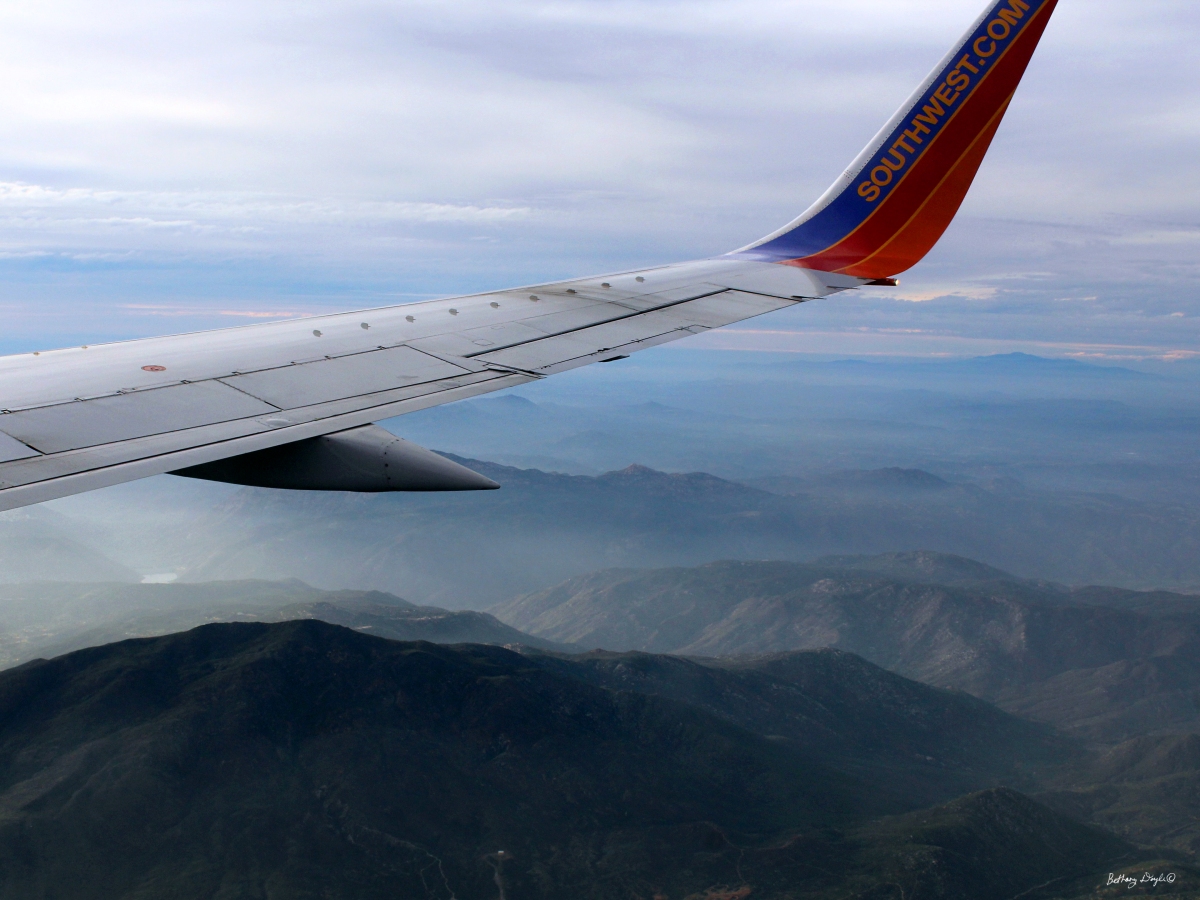
We did eventually arrive in San Francisco, after over nineteen hours of travel, and to reward ourselves for making it through the day, we went to In and Out burger. It was around that time that a few others and I observed that sleep deprivation affects my brain. I felt a little loony, became very slaphappy, and was called a “Pancake-Stack-of-Fun”. Upon returning from our glorious meal at In and Out, we went to bed, and thus ended our long day of travel.
It was sunny on Sunday morning, the Lord’s Day, and we had the opportunity to do what the day was meant for, resting… for the most part. We did eventually go grocery shopping because we needed food for during the week. In the afternoon we headed out to Church of the Sojourners, a house church or Christian commune. It was there that we went to church for the week. I liked how before we engaged in any sort of service or ministry, we first went to church. We started our week off with God, and very importantly, with community. If Church of the Sojourners does anything right, it is community. They have several families who are members, who all live in the neighboring buildings that the church owns. The members share space, time, and money. They share space by living together, time by having a few meals together a few times a week and all worshipping together on Sundays, and money by always giving a portion of their income to the church.
The emphasis on community carried on into the Sunday worship as they worship began with the bread or Communion and then closed with the wine, and had everyone eating dinner together in the middle. There were worship songs, liturgy, and a sermon of course. It was church after all, but living together in a community for Christ was what was most important. What was also cool and interesting, was that the members of Sojourners took time in the middle of the service to affirm one another for the good things that they had done during the week. It fostered a community of love. It was fitting that we began our week with worship of God, and a reminder of the importance of community. We had to know why were there and what was most important. We adopted that practice of affirming one another in our debrief meetings at the end of each day in the trip, and it brought friendship between us. Debrief, though long, became a highly enjoyed and looked forward to event for the remainder of the days of the week.
On Monday, we worked with InnerCHANGE ministries. InnerCHANGE is a Christian organization dedicated to combating poverty. The organization is set up like a Franciscan order, which was fitting. San Francisco is after all named after Saint Francis. The InnerCHANGE branch in San Francisco works primarily with homelessness, for there is a huge population of homeless people in San Francisco. The director of InnerCHANGE in San Francisco is Claire Howard, a wonderful dedicated woman who is passionate about helping the homeless there in ways that most people do not think of because she understands that to truly help people involves building solid relationships. Every Monday morning, she and other InnerCHANGE employees and volunteers host a pancake breakfast in the Golden Gate Park. This was our first activity with InnerCHANGE ministries.
When we were given the guidelines for participating in pancakes in the park, one of the things that caught my eye was that it is illegal to serve food to homeless people in Golden Gate Park. However, InnerCHANGE claimed that they did not do that. They had a pancake breakfast every morning with their friends. Both those statements were significant. The first, because it was the first law that I became aware of that oppressed the homeless in San Francisco, and the second, because it provided the better way to help the homeless. Simply serving someone food or giving them money and leaving is not helpful, because we learned, it creates a power dynamic. The giver is in power, and the receiver is reduced to an object as opposed to a human to make the giver feel like a good person. We were supposed to make friends with the attendees of Pancakes in the Park, listen, and remind them that they are human. We were reminded that right, just giving a panhandler on the streets spare change is rarely helpful and creates the power dynamic, but eye contact, a smile, and a word are because they remind people of their worth as human beings. We also learned that the word homeless is not really a good word. Many of the people are wanderers, travelers…people who cannot stand to be cooped up inside. Many of them did come from difficult backgrounds.
It was at Pancakes in the Park, that I first came into contact with stories. There was a man there who had once been an army medic. He was not anymore. He had chosen the life outdoors because he could not stand to be cooped up in an office. He had to be out. He also had three dogs, beautiful nearly wild dogs. There was an abundance of dogs at Pancakes, and all of them looked happy and healthy, healthier than their owners. Many of the people who lacked proper housing avoided shelters because that would require separation from their beloved animals.
Were many of the people at pancakes into drugs? Yes. Smoking weed was against the rules at Pancakes, but we did not really have to wonder what people were doing on the other side of the hill. Drug dealing frequently became a way of life for people who could not find jobs or homes, but condemning people at pancakes for their drug use would not be helpful in sobering them up. They had to have already heard the whole spiel on how drugs were bad for them and that they should not do them, so telling them so would be alienating and create a power dynamic. It was us telling them what to do without true knowledge of them. This was where building relationships with the people came in. We had to get to know them.
There was a man, (all names of homeless or former homeless people have been changed), Bob, who had been coming to Pancakes for a while, and was friends with Claire. He had been addicted to hard drugs, came from a wild past, and had previously not had proper housing. In fact, homeless shelters had not helped him, because when he was un-housed in Utah, it was the shelters that he got the drugs from. Then his girlfriend became pregnant. It was Mike’s wakeup call. He went to Pancakes, he talked to Claire, and he began the process of sobering up and getting housed, and he succeeded. He knew that he needed to assume the role of a father. Bob is no longer addicted to heroin, and he is slowly getting off alcohol. There was also Jeff, a formerly un-housed man who is now a successful talented artist.
One of the most touching stories came from a young woman, Janie, who lived with InnerCHANGE, and volunteered at Pancakes. When Claire first met her, she was thirteen, living in a bus with her family, and neither her nor her siblings were under any sort of supervision. They were on drugs and doing anything. InnerCHANGE worked with Janie’s family for years. There were highs and there were lows. Janie’s dad and brother ended up drowning, and Janie was on the streets. But she did finish high school, currently lives with InnerCHANGE, volunteers at pancakes, and voluntarily attends a church.
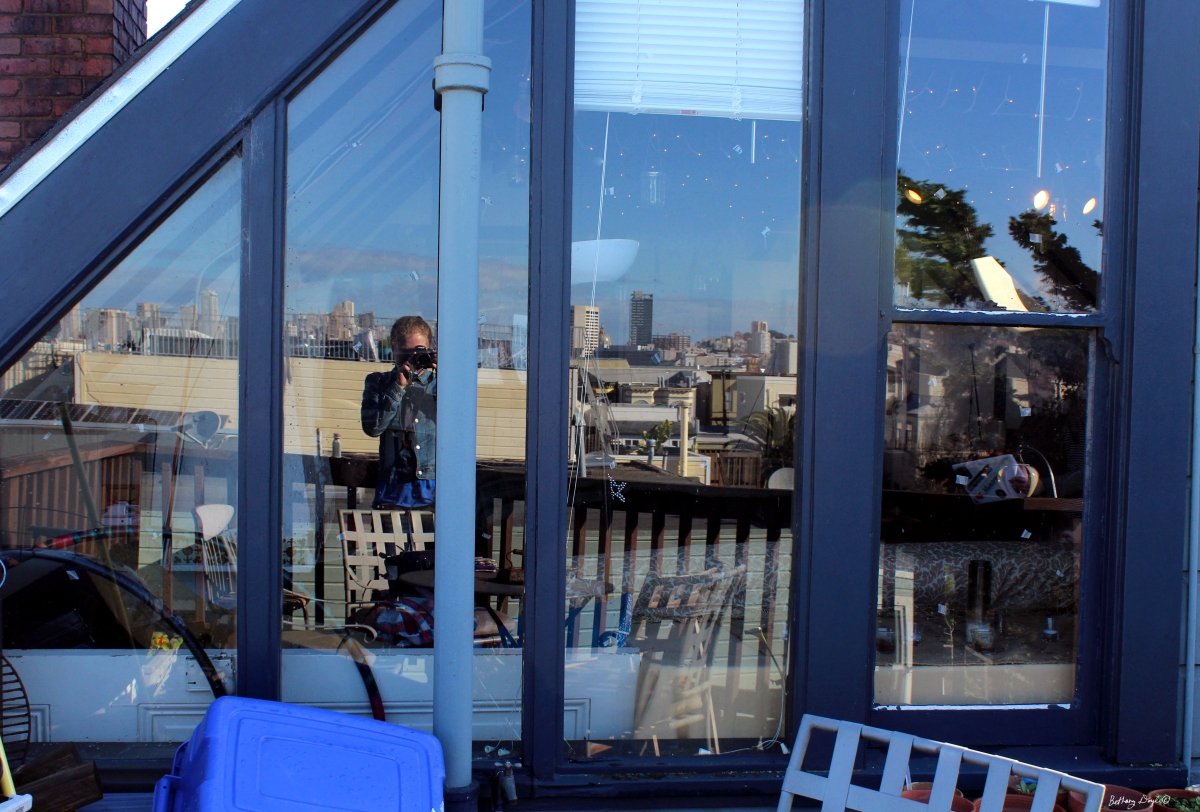 We spent all of Monday with InnerCHANGE doing a variety of activities. When we got to the InnerCHANGE building, we were sent off alone to pray (I took the above picture on the balcony where I prayed). It was a great experience. It made me realize that behind every person huddled on the street is a story that needs to be told. Apparently, that is something few people realize, based on how the legal system of San Francisco oppresses the homeless. The lawmakers recognize that the city has a very large homeless problem, but instead of trying to fix the problem, they try to eliminate it. The first example was the fact that it is illegal to serve homeless food in the Golden Gate Park. Claire informed us of more examples. The public restrooms are closed at night. They close the tunnels in the park when it rains. When it was Super Bowl weekend, all of the homeless people were swept to under an overpass so that the visitors of the city would not see them. They were not housed. They were not recognized as real human beings.
We spent all of Monday with InnerCHANGE doing a variety of activities. When we got to the InnerCHANGE building, we were sent off alone to pray (I took the above picture on the balcony where I prayed). It was a great experience. It made me realize that behind every person huddled on the street is a story that needs to be told. Apparently, that is something few people realize, based on how the legal system of San Francisco oppresses the homeless. The lawmakers recognize that the city has a very large homeless problem, but instead of trying to fix the problem, they try to eliminate it. The first example was the fact that it is illegal to serve homeless food in the Golden Gate Park. Claire informed us of more examples. The public restrooms are closed at night. They close the tunnels in the park when it rains. When it was Super Bowl weekend, all of the homeless people were swept to under an overpass so that the visitors of the city would not see them. They were not housed. They were not recognized as real human beings.
Tuesday was also an emotionally heavy day, for we went to the Tenderloin neighborhood. That was my first time being immersed in urban poverty. To think that I go to school 40 minutes from Chicago, and my home is fifteen minutes from Newburgh, NY and an hour away from New York City, and I have never really been in urban poverty. I am always adjacent to poverty, but in the bubble that I reside in, I never see it, and there I was in the Tenderloin. Shortly after stepping off the bus, we witnessed a few drug deals. Then there was the man shooting up heroin in the street in broad daylight. The streets were littered with people, and there were the ever-present people without proper housing huddled up against the buildings’ walls. We walked to the Youth With a Mission (YWAM) building, where we were greeted with a friendly German man in a Wheaton College sweatshirt. He would be our guide for the day.
After describing how YWAM was founded and what the San Francisco branch does (offers showers on some days, free haircuts on others, support, food, necessities, prayer, etc), he went into describe what we would be doing during the day. Our first activity would be a prayer walk. I forgot what the first option for the prayer walk was for, but the second was for victims of human trafficking. We went with the human trafficking one without any real idea of what we were getting into.
Our guide informed us that there was a large amount of human sex trafficking in San Francisco, and the amount had skyrocketed during the Super Bowl weekend. The brothels were disguised as massage parlors and spas, and they were easy to identify, for they were always locked and barred with security cameras. Despite the easy identification, they were incredibly difficult to shut down. To be shut down, the department of health needed to find three red flags, like masseuses in lingerie or a bed, in the span of nine months. However, once a red flag was reported, it would be eliminated immediately, the massage parlor would be switched in ownership to someone else in the mob, or it would be registered as a spa instead, and the department of health would be back at square one.
As our guide described what happened right outside the door, I was not sure what disturbed me more, the fact that there was an abundance of illegal brothels less than a mile away in a touristy American city, or the simple matter-of-fact tone in which he stated everything. He might as well have said, “Yup, atrocities happen here all the time. You know, just another day.” He did not of course, but it felt like it.
We then began the prayer walk. If the goal of our trip was to learn that the first step to helping people was to see that they were human, then it was the prayer walk that I struggled. Before we set out, our guide made a statement more directed to the guys in our group that there would not be a supply of sex trafficking if there was not a demand for it. Although it reminded the males of our team that it is most certainly not the women’s fault, it was what caused me to struggle to see the men involved as human. As we began our walk, which could not have been that much more than a mile loop, stopping outside the “spas” or “massage parlors” to pray, I felt anger burning in me. How could anyone do such a thing? How could anyone prey upon a young vulnerable woman and force her to be a slave? How could anyone continuously force her to be nothing but an object to sate the carnal desires of wretched men? How could anyone deprive her of humanity? I could not see the spas managers or customers as human. As someone who has never been a man or dealt with lust, how could I do so easily? We were told to pray for the men who went in there and ran those places as well as the women victims so that the men would stop, but I struggled to pray for them. Instead I just prayed for justice, not that that was a bad thing, for justice were certainly needed, but I refused to see the hurt and pain that also lingered on the other side and forced men to be unable to see beyond themselves.
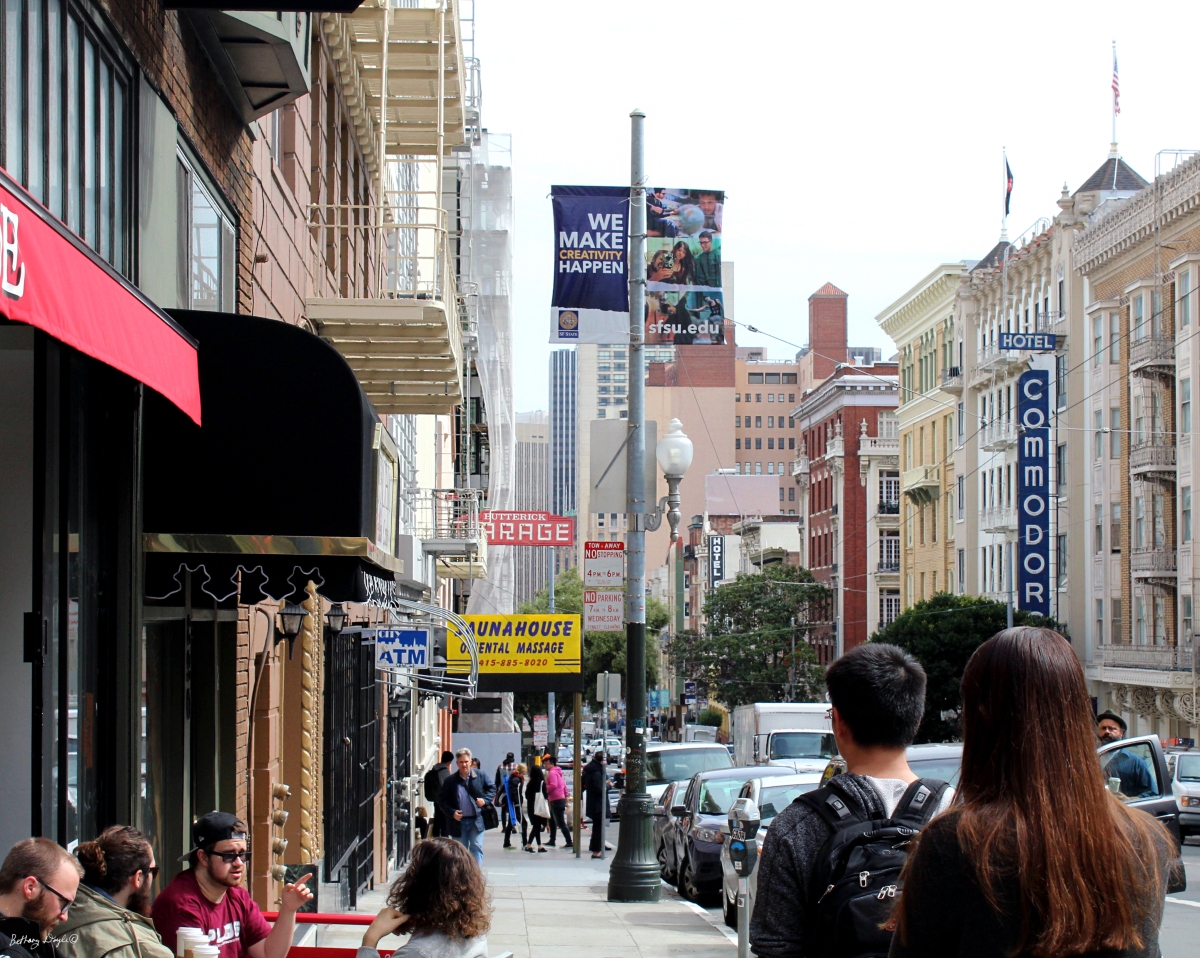 After the prayer walk, we visited the dance studio that YWAM ran. The dance studio was a way to empower young girls and give them an outlet to stay off of the streets as they approach adolescence. Many of the girls that dance there were from poor immigrant families. The dance studio was a piece of beauty in a torn up neighborhood.
After the prayer walk, we visited the dance studio that YWAM ran. The dance studio was a way to empower young girls and give them an outlet to stay off of the streets as they approach adolescence. Many of the girls that dance there were from poor immigrant families. The dance studio was a piece of beauty in a torn up neighborhood.
When we returned to the YWAM building, it was lunchtime, but we were not going to eat there. Trays of bread, meat, cheese, peanut butter, and jelly were brought out, and we were instructed to make two sack lunches: one for us, and one for a person on the streets, also called a friend. We then constructed sandwiches and added snacks to the bags. When we were ready, we set out to the Civic Center.
Our walk to the civic center took us through a bad neighborhood where once again there were people on the streets doing things to themselves that they should not have been doing. When we got to the Civic Center, we were given instructions to break up into groups of no more than four with a boy in each group. We then had to go find some more impoverished people and ask if we could eat lunch with them.
One of the boys on the team and I wandered around for a while before we finally plucked up the courage to approach two women lounging on the lawn outside the city hall. Although asking to eat with them and sitting down started out as a little awkward, the situation did improve. The women were named Debbie and Grace (names once again changed), and they were not originally from the Bay area. They had been stranded in San Francisco for about a month after they came to the area to see the Bridge, but their car broke down. Debbie did most of the talking. She chatted happily, and we learned a lot about the city from her.
Debbie and Grace enjoyed people watching, which led them to like San Francisco because of all the diverse people in it and all of the events that went on. Even as people without proper housing, they were as surprised by the large homeless population in the city as we were, and they were also surprised by the amount of dogs that the homeless people add, all of whom ate better than their owners. They informed us that protests were very frequent in the Civic Center area, and that there were once people protesting naked, which they did not like.
The best news they gave us though was that there was hope for the Tenderloin. They also observed that there were a lot problems and drugs in the Tenderloin, but Debbie also pointed out that it was a neighborhood and that the people there knew that. Debbie said, “It is a neighborhood with kids, and they clean up when the kids come back from school. When the kids come back they all put away the drugs, say ‘The kids are coming. The kids are coming,’ and smile at the kids as they all walk by. It’s like they try to keep them innocent.” It was a reminder that all can be redeemed. God never left this world without hope.
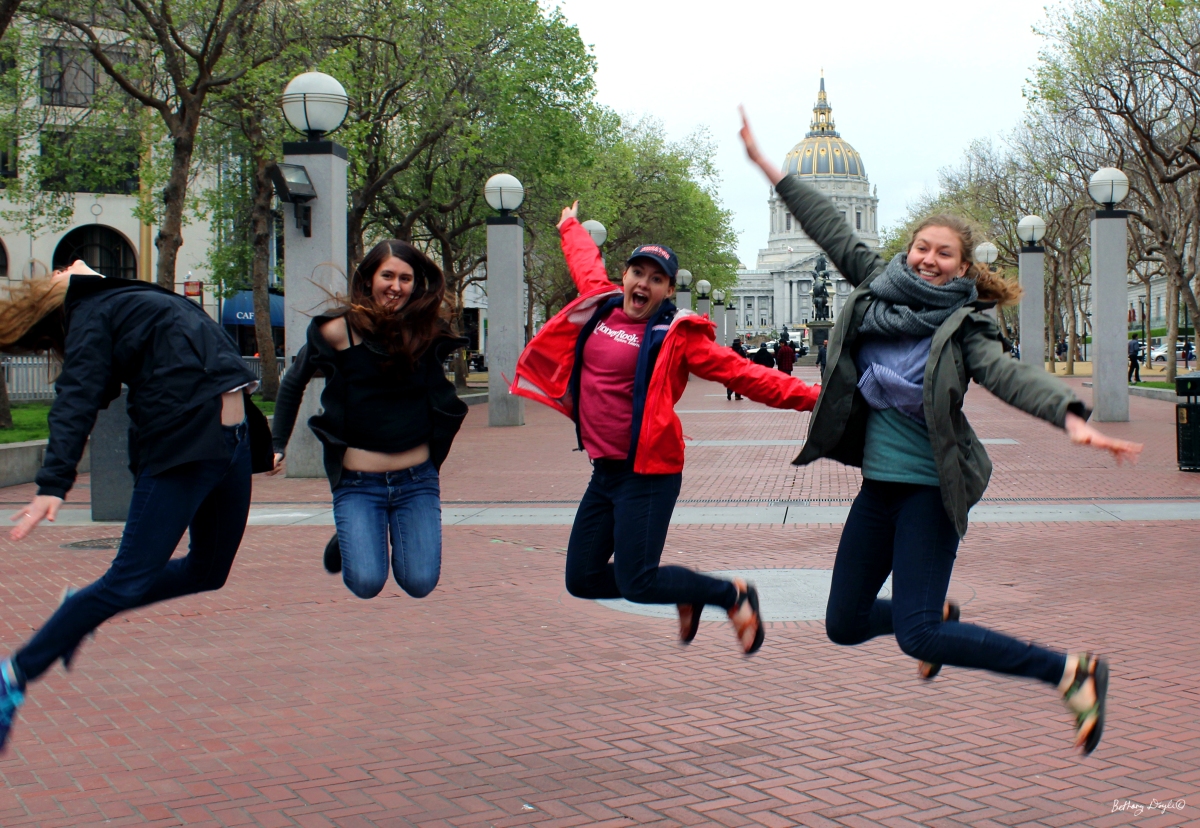 We had the rest of Tuesday for ourselves to reflect on our day. We made dinner at the hostel and got ready for Wednesday. Wednesday was blessedly much less emotionally heavy than the earlier two days. We volunteered at the San Francisco Marin Food, and packed food for a few hours. There were other college kids on mission trips or alternative Spring Breaks volunteering at the food bank too, and they were among the people we worked with. After the food bank, we headed out to First Baptist Church, which served dinner low-income people in the city. We helped make dinner, which was fun, had a Bible study with a few members, and then ate dinner after we served it to the guests. They were engaging, and it was a nice evening.
We had the rest of Tuesday for ourselves to reflect on our day. We made dinner at the hostel and got ready for Wednesday. Wednesday was blessedly much less emotionally heavy than the earlier two days. We volunteered at the San Francisco Marin Food, and packed food for a few hours. There were other college kids on mission trips or alternative Spring Breaks volunteering at the food bank too, and they were among the people we worked with. After the food bank, we headed out to First Baptist Church, which served dinner low-income people in the city. We helped make dinner, which was fun, had a Bible study with a few members, and then ate dinner after we served it to the guests. They were engaging, and it was a nice evening.
Our team members either loved or hated what we did on Thursday. We went to Laguna Honda hospital, which is a residential hospital and rehabilitation center. It was a bit like a nursing home. We worked with senior citizens under twenty-four hour nursing, most of whom did not have families to come and visit them. Our guide for the day’s job was to insure that the residents of the hospital had as close to a normal life as possible, so he planned events for them. The events for them that we were volunteering for were a movie, Grease, and a Spring Fling dance. Our job was to go up to the wing that the residents lived in, bring them down (in their wheelchairs) to the venue for the movie and dance, and then be the life of the party for them.
I thought that the experience was enjoyable, because I like watching movies with people, and dances are always fun. Just being around nice people in general is a recipe for a good time; however, some of our group members had entirely different opinions. Many, but not all, of the residents were suffering from dementia or some other mental degenerative disease. I would ask them how they were feeling, and would be rewarded with a blank stare. Many of them had full retention of their minds, but a large amount of the residents were not all there. It was rather upsetting. It did not really bother me, but some of the boys on our team felt otherwise.
One of the boys was absolutely charming to the residents and graced the dance floor with perfect suavity, grasping the hands of the wheelchair-bound residents and dancing around them and with them like an utter gentlemen. Once we were by ourselves however; the façade collapsed, and he crumbled. During or debrief, when asked how he felt about the day, he just shrugged his shoulders and matter-of-factly said, “Well, I hated it,” and he had good reasons why. To him, surrounded by people confined to wheelchairs who could not communicate while we put on events for them was miserable. It was not a real dance. It was not a real movie party. It was all fake glitter coating gross misery. Was mental degeneration and utter helplessness the unavoidable end of our existences on Earth? Would our grandparents soon be like that? Would we all be imprisoned nursing homes one day, unable to communicate our pain and without relatives to visit us, only to watch as our consciousnesses dwindled to near non-existence? The fact that it could happen to us was horrifying to him, and to a few others of us.
Those questions had not occurred to me. I never thought everyone would end up like that before death, and I preferred not to think sixty-seventy years down the road to that possibly happening to me. It was too far away for me to consider. I preferred to think about what I was doing that day.
On Friday, our only event was a dinner in China Town in the evening, so we were finally given the opportunity to be tourists, and so I was. One of the other girls on the team and I met up with a friend, where we proceeded to do just about everything, from going to the Bridge to eating at a food truck. It was definitely the most fun day of the trip.
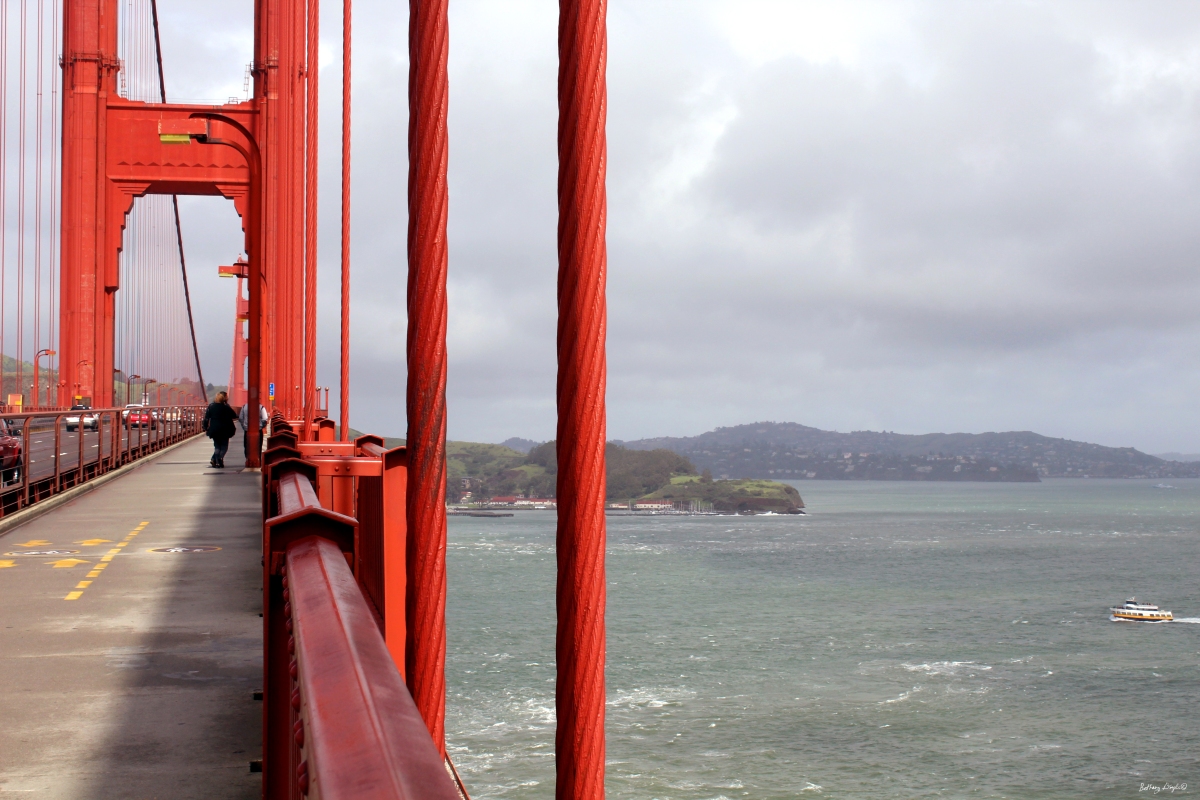
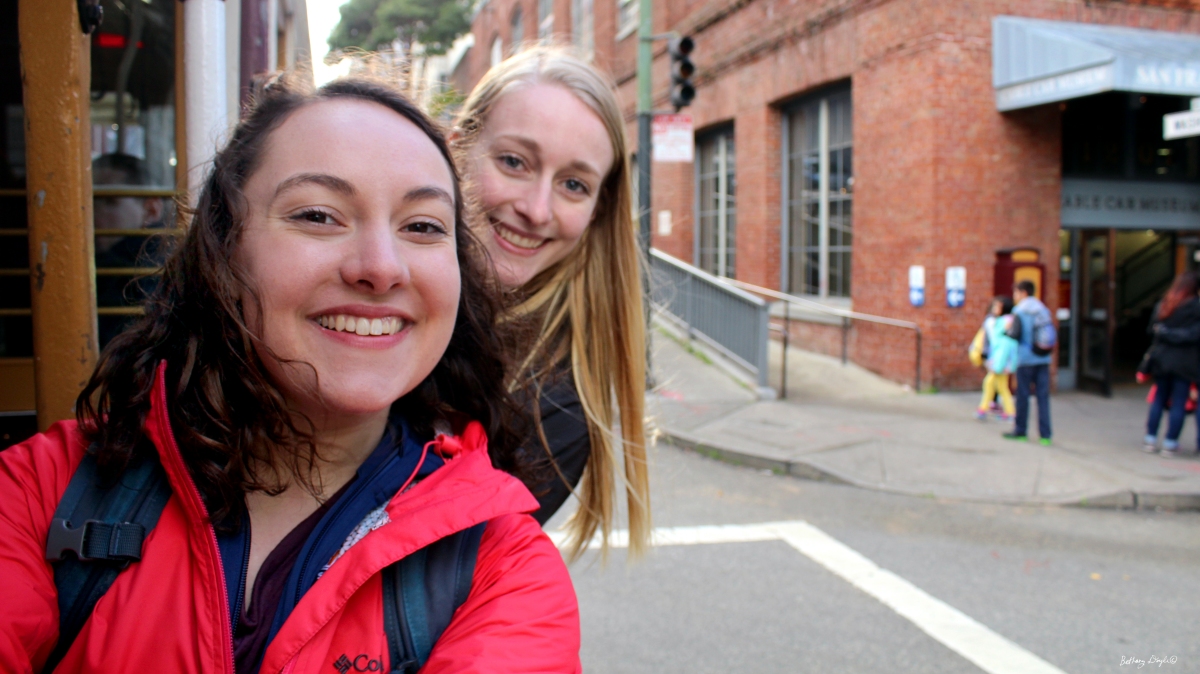 On Saturday, we headed off to the airport, said our goodbyes to San Francisco, and went back to Illinois, and as usual our flight was delayed, but at least this time it was direct. The week was over. It was time to go back to school, but not without new experiences and friends. I still stay in touch with most of the members of our team, and the trip did give me a new perspective. When I first signed up to go on a Breakaway, I was really not sure what I was signing up for. The description did say that I would need to be able to handle emotionally heavy experiences, but that was pretty much all I knew about what we were doing. I had no real idea of what I was getting in to, but I knew that I had committed to going and that I could handle anything that the trip offered.
On Saturday, we headed off to the airport, said our goodbyes to San Francisco, and went back to Illinois, and as usual our flight was delayed, but at least this time it was direct. The week was over. It was time to go back to school, but not without new experiences and friends. I still stay in touch with most of the members of our team, and the trip did give me a new perspective. When I first signed up to go on a Breakaway, I was really not sure what I was signing up for. The description did say that I would need to be able to handle emotionally heavy experiences, but that was pretty much all I knew about what we were doing. I had no real idea of what I was getting in to, but I knew that I had committed to going and that I could handle anything that the trip offered.
I expected that the trip would change me some how, and it did. I was offered a new perspective on what is important. They always say that good relationships are better for you in life than acquiring things. The same can be said for helping the poor. Sure, feed them, but what causes poverty if not a state of broken relationships, broken relationships with the land, the state, God, and especially people.
What has set apart my time at Wheaton from my time back home has been the emphasis on relationships and community. As humans, we are relational beings. We are meant for community with each other and with God. With the emphasis on community at Wheaton that I encountered, I became much happier in college than I was while struggling to belong at my high school back home. I received first hand knowledge on the necessity of community. If we just give people things, what are we really doing? Are we making experiences, are we really showing love, or are we just inflating our egos? Are we actually helping the people, or are we contributing more to power dynamics and a lack of human treatment. Hug your friends, say “Hello”, and give a smile and eye contact to those who don’t receive it.